The Republic of Estonia gained its independence from the Russian Empire on 24 February 1918 and established diplomatic relations with many countries via membership of the League of Nations. The forcible incorporation of Estonia into the Soviet Union in 1940 was not generally recognised by the international community and the Estonian diplomatic service continued to operate in some countries. Following the restoration of independence from the Soviet Union, Russia was one of the first nations to re-recognize Estonia's independence. Estonia's immediate priority after regaining its independence was the withdrawal of Russian forces from Estonian territory. In August 1994, this was completed. However, relations with Moscow have remained strained primarily because Russia decided not to ratify the border treaty it had signed with Estonia in 1999.

The Estonian Centre Party is a left-centrist political party in Estonia. It was founded in 1991 as a direct successor of the Popular Front of Estonia, and it is currently led by Mihhail Kõlvart.
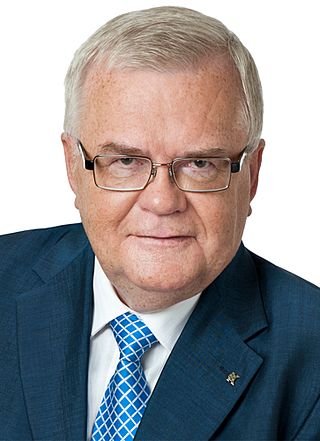
Edgar Savisaar was an Estonian politician, one of the founding members of Popular Front of Estonia and the Centre Party. He served as the acting Prime Minister of Estonia, Minister of the Interior, Minister of Economic Affairs and Communications, and twice mayor of Tallinn.
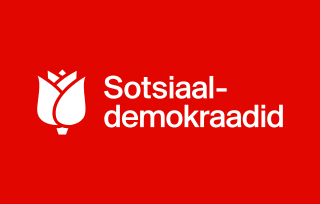
The Social Democratic Party is a centre-left political party in Estonia. It is currently led by Lauri Läänemets. The party was formerly known as the Moderate People's Party. The SDE has been a member of the Party of European Socialists since 16 May 2003 and was a member of the Socialist International from November 1990 to 2017. It is orientated towards the principles of social-democracy, and it supports Estonia's membership in the European Union. From April 2023, the party has been a junior coalition partner in the third Kallas government.

Toomas Hendrik Ilves is an Estonian politician who served as the fourth president of Estonia from 2006 until 2016.

Lesbian, gay, bisexual, and transgender (LGBT) rights in Estonia have advanced significantly over the course of the last few decades, especially since the turn of the 21st century. Among the countries which after World War II were controlled by the former Soviet Union, independent Estonia is now considered to be one of the most liberal when it comes to LGBT rights. There is a notable age gap, as younger people tend to be more tolerant and liberal, while older people tend to be more socially conservative.
Same-sex marriage has been legal in Estonia since 1 January 2024. The government elected in the March 2023 election, led by Prime Minister Kaja Kallas and consisting of the Reform Party, the Social Democrats and Estonia 200, vowed to legalize same-sex marriage. Legislation to open marriage to same-sex couples was introduced to the Riigikogu in May 2023, and was approved in a final reading by 55 votes to 34 on 20 June. It was signed into law by President Alar Karis on 27 June, and took effect on 1 January 2024. Estonia was the first Baltic state, the twentieth country in Europe, and the 35th in the world to legalise same-sex marriage.
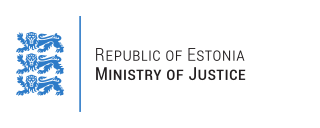
The Estonian Ministry of Justice is the Ministry of Justice of Estonia. The Minister of Justice is the senior minister at the Ministry of Justice in the Estonian Government. The Ministry is responsible for providing support to the court system and providing legal focus in proposing new laws.

Tartu Ülikooli korvpallimeeskond, also known as Tartu Ülikool Maks & Moorits for sponsorship reasons, is a professional basketball team based in Tartu, Estonia. They are a part of the University of Tartu Academic Sports Club. The team plays in the Estonian-Latvian Basketball League and the Korvpalli Meistriliiga (KML). Their home arena is the University of Tartu Sports Hall.

The Ministry of the Interior of Estonia is a Ministry in the Estonian Government. The current Minister of the Interior is Lauri Läänemets.

Foreign relations exist between Australia and Estonia. Australia first recognised Estonia on 22 September 1921. Australia was among the first countries to re-recognise Estonia's independence on 27 August 1991. Both countries re-established diplomatic relations on 21 November 1991.
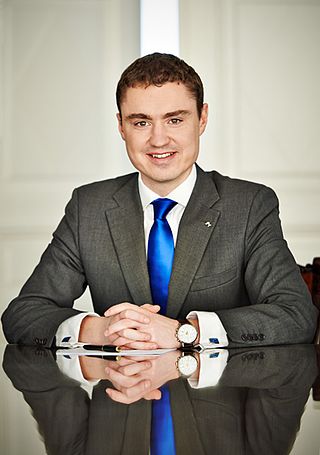
Taavi Rõivas is an Estonian politician, former Prime Minister of Estonia from 2014 to 2016 and former leader of the Reform Party. Before his term as the Prime Minister, Rõivas was the Minister of Social Affairs from 2012 to 2014. On 9 November 2016 his second cabinet dissolved after coalition partners, Union of Pro Patria and Res Publica and Social Democratic Party, sided with the opposition in a no confidence motion. At the end of 2020, Rõivas announced quitting politics, and resigned from his parliament seat.

Kaja Kallas is an Estonian politician and the current prime minister of Estonia since 2021, the first woman to serve in the role. The leader of the Reform Party since 2018, she was a member of parliament (Riigikogu) in 2011–2014, and 2019–2021. Kallas was a member of the European Parliament in 2014–2018, representing the Alliance of Liberals and Democrats for Europe. Before her election to Riigikogu, she was a lawyer specialising in European competition law.
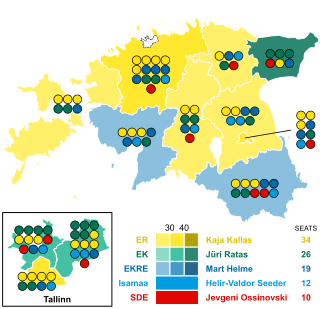
Parliamentary elections were held in Estonia on 3 March 2019. The newly elected 101 members of the 14th Riigikogu assembled at Toompea Castle in Tallinn within ten days of the election. The Reform Party remained the largest party, gaining four seats for a total of 34 and the Conservative People's Party had the largest gain overall, increasing their seat count by 12 to a total of 19 seats.
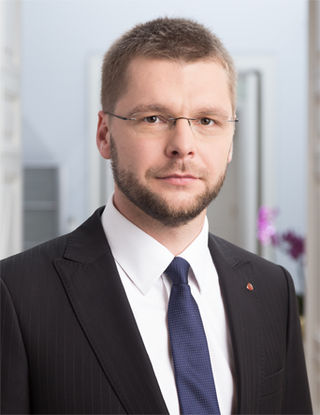
Jevgeni Ossinovski is an Estonian politician, former leader of the Estonian Social Democratic Party.

Liisa Oviir is an Estonian lawyer and politician who was Estonia's Minister of Entrepreneurship from 2015 to 2016. Oviir has graduated from the Faculty of Law of the University of Tartu in 2000.

Jüri Ratas's cabinet was the 49th cabinet of Estonia, in office from 23 November 2016 to 29 April 2019. It was a centre-left coalition cabinet of Centre Party, Social Democratic Party and conservative Pro Patria and Res Publica Union. It was preceded by the Second Cabinet of Taavi Rõivas, a cabinet that ended when Social Democrats and the Union of Pro Patria and Res Publica joined the opposition's no confidence vote against the cabinet. This was the first time since 1999 the liberal centre-right Reform Party were out of the government.

Monika Haukanõmm is an Estonian social worker and politician who has been representing the Estonian Free Party in the Riigikogu since 2015.
An election for the Members of the European Parliament from Estonia will take place on June 9.

Tanel Kiik is an Estonian politician and former cabinet minister.


















